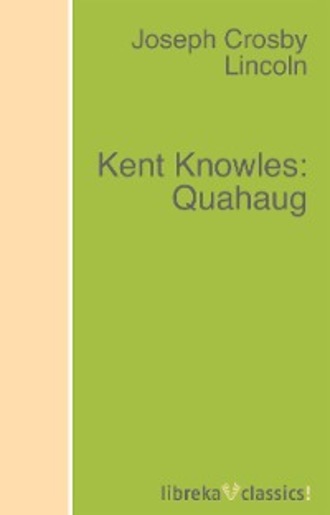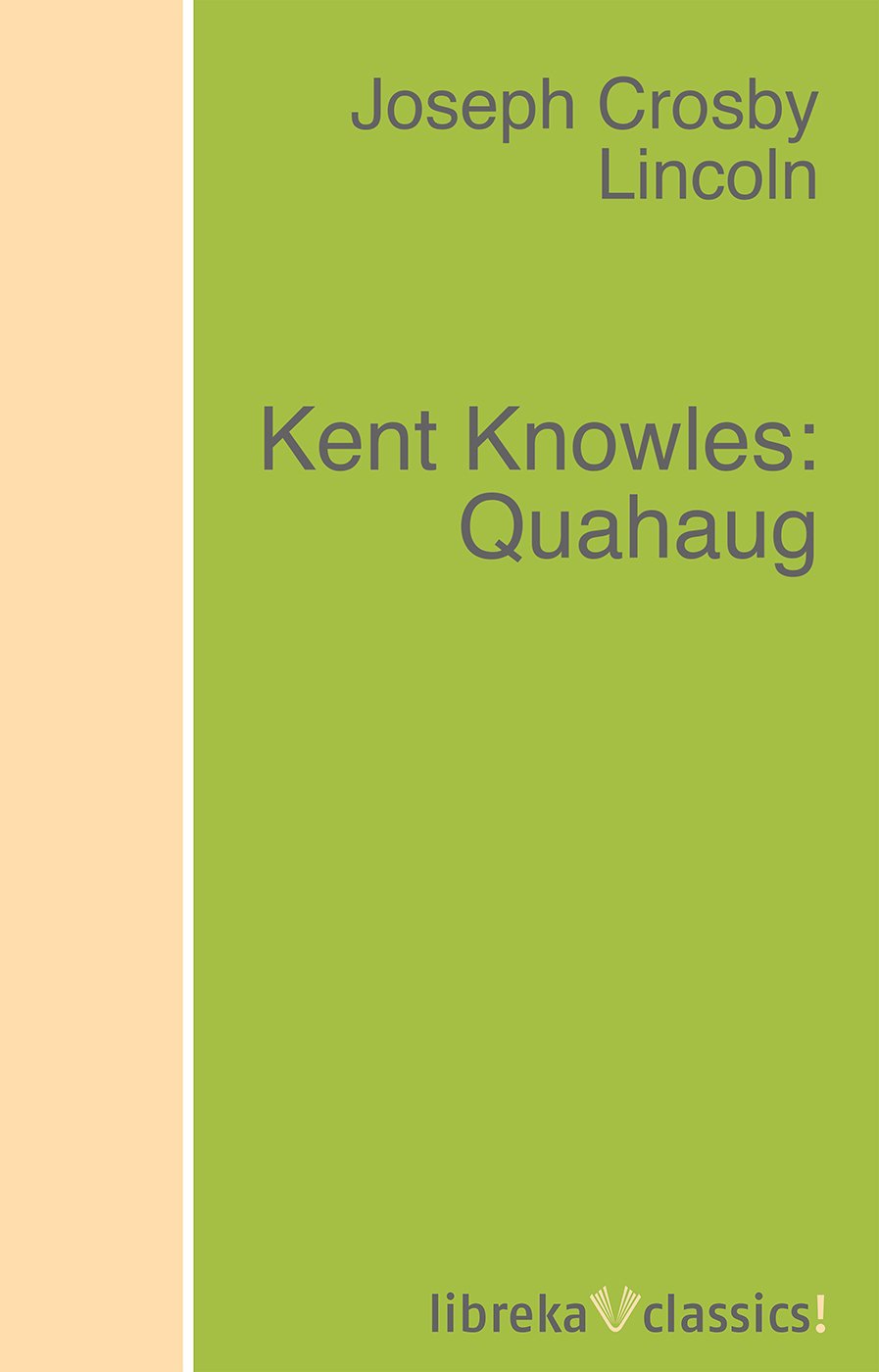
Полная версия
Kent Knowles: Quahaug


Titel: Kent Knowles: Quahaug
von Oliver Goldsmith, Samuel Pepys, William Dean Howells, John Burroughs, William Harmon Norton, L. Mühlbach, Franklin Knight Lane, Walter Pater, Jonathan Swift, Augusta J. Evans, Trumbull White, Kathleen Thompson Norris, Matthew Arnold, Charles W. Colby, Shakespeare, James Fenimore Cooper, D. H. Lawrence, James Joyce, Ada Cambridge, Philip E. Muskett, Catherine Helen Spence, Rolf Boldrewood, Ernest Scott, Fergus Hume, H. G. Wells, Victor [pseud.] Appleton, Roald Amundsen, Max Simon Nordau, Henry David Thoreau, E. Phillips Oppenheim, Richard Wagner, Franz Liszt, Charlotte Mary Yonge, Charles Henry Eden, Charles Babbage, T. R. Malthus, Unknown, Joseph Ernest Morris, Robert Southey, Isabella L. Bird, Charles James Fox, Thomas Hariot, Cyrus Thomas, Bart Haley, Christopher Morley, Edgar Saltus, Marie Corelli, Edmund Lester Pearson, Robert Browning, John Aubrey, Benjamin Nathaniel Bogue, John McElroy, John Galsworthy, Henry James, Hamilton Wright Mabie, Mina Benson Hubbard, Elizabeth Cleghorn Gaskell, John Keble, Henry Lindlahr, Richard Henry Dana, Annie Wood Besant, Immanuel Kant, John Habberton, Baron Edward John Moreton Drax Plunkett Dunsany, T. B. Ray, Isabel Ecclestone Mackay, Frank C. Haddock, William John Locke, baron Arthur Léon Imbert de Saint-Amand, Ralph Centennius, United States, Library of Congress. Copyright Office, James Otis, George Hartmann, Sir Arthur Conan Doyle, George Gissing, John Henry Tilden, Thomas Wright, Frederick Samuel Dellenbaugh, Anonymous, J. Clontz, David Hume, Margot Asquith, Elmer Ulysses Hoenshel, Byron J. Rees, Lida B. McMurry, Georges Duhamel, Ramsay Muir, Edith Wharton, Charles Sturt, Lola Ridge, J. M. Stone, Annie Payson Call, Grant Allen, kniaz Petr Alekseevich Kropotkin, Steve Solomon, Isabel Moser, Aleksandr Sergeevich Pushkin, Horace W. C. Newte, Charles Darwin, Maurice Maeterlinck, Walter Bagehot, Henri Bergson, George Randolph Chester, John S. C. Abbott, L. Frank Baum, William T. Sherman, Philip Henry Sheridan, Friedrich Wilhelm Nietzsche, Ambrose Bierce, Ulysses S. Grant, F. Scott Fitzgerald, Alfred Lichtenstein, Abbot of Nogent-sous-Coucy Guibert, Nellie L. McClung, Alice Caldwell Hegan Rice, E. Nesbit, Henri Barbusse, J. M. Synge, Frank Norris, Louis Hémon, Henry Van Dyke, Thomas Guthrie Marquis, Susanna Moodie, Frank Bigelow Tarbell, René Descartes, Kirk Munroe, Francis Hopkinson Smith, Edna St. Vincent Millay, Talbot Mundy, George Meredith, Clemens Brentano, James De Mille, James Allen, Norman Douglas, Bolton Hall, Arthur Christopher Benson, James Oliver Curwood, Frank Jardine, Bertram Lenox Simpson, Freiherr von Justus Liebig, Cyril G. Hopkins, Mary Eleanor Wilkins Freeman, Evelyn Scott, Charles Monroe Sheldon, George Berkeley, Steven Sills, Sara Jeannette Duncan, Jules Verne, Irvin S. Cobb, Zane Grey, August von Kotzebue, John Addington Symonds, Marjorie Allen Seiffert, J. B. Bury, William Makepeace Thackeray, Jules Renard, Susan Coolidge, Huguette Bertrand, Mrs. C. F. Fraser, Ottilie A. Liljencrantz, William Morton Payne, Henry Adams, T. S. Arthur, Orison Swett Marden, T. S. Ackland, Anthony Trollope, graf Leo Tolstoy, Robert Smythe Hichens, Émile Gaboriau, Wilkie Collins, Charles Reade, Horace Walpole, Jennette Lee, Thomas Dykes Beasley, Inez Haynes Gillmore, L. H. Woolley, John Francis Davis, James B. Stetson, William Day Simonds, James O'Meara, Almira Bailey, Cuthbert Bede, Voltaire, Percy Bysshe Shelley, William Bennett Munro, Sir Richard Francis Burton, Horatio Alger, Paul Verlaine, Samuel Vaknin, William Ralph Inge, Madame de Staël, J. Hector St. John de Crèvecoeur, L. A. Abbott, F. Colburn Adams, John S. Adams, Thornton W. Burgess, Glenn D. Bradley, Eugen Neuhaus, Arthur E. Knights, Bret Harte, Maturin Murray Ballou, Jane G. Austin, Samuel Johnson, Frederick Niecks, Stephen Leacock, Suelette Dreyfus, Stéphane Mallarmé, Lyndon Orr, William Le Queux, Mary Wollstonecraft Shelley, Jeannie Gunn, Jean François Regnard, John Ruskin, A. I. Kuprin, Pierre Louÿs, George Barr McCutcheon, John Munro, Holman Day, William Stearns Davis, John Richardson, Mary Jane Holmes, Oliver Wendell Holmes, Finley Peter Dunne, C. J. Dennis, Ethel Sybil Turner, Julius Wellhausen, Arnold Bennett, Harold Bell Wright, Guðmundur Kamban, Charles Stuart Calverley, A. E. W. Mason, Charles Rivière Dufresny, David Starr Jordan, Wallace Irwin, J. W. Wright, Thomas Hardy, United States Rubber Company, Helen Reimensnyder Martin, William Fayette Fox, Lewis Carroll, Anna Katharine Green, Shell Union Oil Corporation, Louisa May Alcott, Theocritus, of Phlossa near Smyrna Bion, Moschus, Bertrand Russell, Guy de Maupassant, Henrik Ibsen, James Whitcomb Riley, Josephine Lawrence, Pierre Loti, Harry Alverson Franck, Albert Payson Terhune, Harold MacGrath, G. A. Henty, Harriet A. Adams, John Lothrop Motley, H. E. Bird, Joseph Crosby Lincoln, Michel Baron, Gene Stratton-Porter, James Clerk Maxwell, Norman Lindsay, Edward Lasker, Margaret Penrose, S. R. Crockett, Austin Hall, Homer Eon Flint, Various, Clarence Edward Mulford, Upton Sinclair, John Andreas Widtsoe, Thomas Bulfinch, David Graham Phillips, John Kendrick Bangs, Edmond Jaloux, Emile Littré, 13th cent. de Boron Robert, Samuel Butler, James Huneker, Jessie Graham [pseud.] Flower, St. George Rathborne, Charles Wesley Emerson, Winston Churchill, Edith Bancroft, Lloyd Osbourne, Jack London, Lyman Abbott, Belle K. Abbott, Sinclair Lewis, H. W. Conn, Ludwig Thoma, Sir Walter Scott, August Strindberg, Thomas Chapais, Ernest Giles, David Wynford Carnegie, Zoeth Skinner Eldredge, Eusebius Joseph Molera, C. C. Andrews, Robert Barr, John Hendricks Bechtel, Robert W. Chambers, Alice B. Emerson, Anna M. Galbraith, Laura Lee Hope, L. T. Meade, Harry Steele Morrison, Frank Gee Patchin, Louise Clarke Pyrnelle, William MacLeod Raine, Roy Rockwood, Edward Stratemeyer, Louis Tracy, Matthew White, Leonardo da Vinci, Albert Einstein, Clarence Young, Ludwig Leichhardt, Arthur B. Reeve, Mrs. Georgie Sheldon, Samuel Hopkins Adams, George Washington, John Adams, Thomas Jefferson, James Madison, James Monroe, John Quincy Adams, Andrew Jackson, Martin Van Buren, John Tyler, James K. Polk, Zachary Taylor, Millard Fillmore, Franklin Pierce, James Buchanan, Abraham Lincoln, Andrew Johnson, Rutherford Birchard Hayes, Chester Alan Arthur, Grover Cleveland, Benjamin Harrison, William McKinley, Theodore Roosevelt, William H. Taft, Woodrow Wilson, Warren G. Harding, Calvin Coolidge, Herbert Hoover, Franklin Delano Roosevelt, Harry S. Truman, Dwight D. Eisenhower, John F. Kennedy, Lyndon B. Johnson, Richard M. Nixon, Gerald R. Ford, Jimmy Carter, Ronald Reagan, George Bush, William Jefferson Clinton, George W. Bush, United States. Presidents., Bjørnstjerne Bjørnson, Rex Ellingwood Beach, Euripides, Henry C. Northam, Mary Raymond Shipman Andrews, Alice Brown, Mary Stewart Doubleday Cutting, Elizabeth Garver Jordan, Elizabeth Stuart Phelps, Mary Heaton Vorse, Edith Wyatt, Bernard Shaw, Georg Büchner, Mrs. Alfred Gatty, Henry Mackenzie, Thomas Henry Huxley, Leonard Huxley, William Hazlitt, Arthur William Dunn, Baroness Emmuska Orczy Orczy, Standish O'Grady, J. M. Barrie, J. G Patterson, Alexandre Dumas père, Alphonse Daudet, Ignatius Donnelly, Henry A. Shute, Walter Savage Landor, E. J. Banfield, George Sand, Gustave Flaubert, William James, Charles Klein, J. Storer Clouston, John Fox, John Stuart Mill, Laurence Hope, Andrew Lang, Vaughan Kester, Molière, Baron George Gordon Byron Byron, Viscount Henry St. John Bolingbroke, Ben Jonson, Émile Zola, Thomas Stevens, Carl Ewald, Anatole France, Edward J. Wickson, Henry M. Stanley, Nicolas Boileau Despréaux, Selma Lagerlöf, Richard Marsh, W. B. Yeats, Ella Wheeler Wilcox, Henry Stevens, Gouverneur Morris, Kaiten Nukariya, Henry Rider Haggard, Frances Boyd Calhoun, George Crabbe, Bertram Waldrom Matz, Joseph A. Altsheler, Petronius Arbiter, F. Marion Crawford, Charles James Lever, John Payne, Harlan Page Halsey, Karl Philipp Moritz, Henry Cruse Murphy, Vingie E. Roe, Mabel C. Hawley, Walter Cox Green, Henry Fielding, Jeffery Farnol, Laura Elizabeth Howe Richards, Howard Roger Garis, Lilian Garis, Carolyn Wells, G. K. Chesterton, Mungo Park, Theodore Dreiser, Arthur Cheney Train, Edward Payson Roe, Robert Louis Stevenson, Asa Gray, Jean de La Fontaine, Frances Hodgson Burnett, Mary Noailles Murfree, Wolfgang Amadeus Mozart, J. S. Fletcher, Elinor Glyn, Jacob Grimm, Wilhelm Grimm, Kenneth Grahame, Wassily Kandinsky, Theodor Fontane, S. Baring-Gould, Johann Wolfgang von Goethe, E. Cherubini, Brett Page, Dom, John Oxley, William F. Drannan, Mark Rutherford, Adelbert von Chamisso, L. M. Montgomery, Edward John Eyre, Dorothy Canfield Fisher, F. H. King, Justin McCarthy, Myrtle Reed, Francis Grose, W. H. Hudson, Andrew Kennedy Hutchison Boyd, Count Anthony Hamilton, Horace, John Brown, Katherine Cecil Thurston, Victor Hugo, Henry Sweet, Robert Hillyer, Amy Brooks, Jean-Jacques Rousseau, Brillat-Savarin, Thomas Bailey Aldrich, Henry Wadsworth Longfellow, Grace M. Remick, Georg Ebers, Francis Bacon, Juliana Horatia Gatty Ewing, Ralph Victor, Sir Francis Darwin, Heinrich Heine, Thomas Sherlock, William Ferneley Allen, Henry Harland, Khalil Gibran, Lady Florence Henrietta Fisher Darwin, Sir William Petty, Juliet Helena Lumbard James, Max Pearson Cushing, Marion Harland, Edward Francis Adams, E. Pauline Johnson, John Drinkwater, James Edward Talmage, Margaret Sidney, William Allen White, Gertrude Page, Michel de Montaigne, Alleyne Ireland, Charles E. Morris, Martinovitsné Kutas Ilona, Ernst Lehrs, Richard Harding Davis, Robert Seymour, Anna Bonus Kingsford, Edmund Burke, Lightheart, Brother of the Resurrection Lawrence, Joseph Conrad, Lucia Prudence Hall Woodbury, Virginia Woolf, Ellis Wynne, Eustace Hale Ball, A. A. Milne, George MacDonald, Arthur Herbert Leahy, W. E. B. Du Bois, Nathaniel H. Bishop, Charles Kingsley, Mark Twain, A. Frank [pseud.] Pinkerton, Alice Turner Curtis, Sax Rohmer, Arthur Scott Bailey, L. Lamprey, Honoré de Balzac, George Durston, William Osmer, Theodore Ayrault Dodge, Prince De Joinville, John Alexander Gunn, Henry Inman, A. E. Housman, Ivan Sergeevich Turgenev, Henry Edward Krehbiel, H. E. Marshall, Arabella B. Buckley, Gabrielle E. Jackson, Sarah J. Eddy, Sarah J. Richardson, Peter B. Kyne, Mary C.E. Wemyss, Ludwig Wittgenstein, Katherine Chandler, baron Ludvig Holberg, Maurice Henry Hewlett, Booth Tarkington, Amelia Edith Huddleston Barr, W. W. Jacobs, W. G. Ivens, Daniel Young, Sam Williams, George William Russell, Durant Drake, Rudyard Kipling, Leonid Nikolayevich Andreyev, William Westgarth, Jane Andrews, Charles Herbert Sylvester, Clarence Budington Kelland, W.B. Laughead, Conrad Ferdinand Meyer, Stephen Palfrey Webb, William John Wills, Thomas Chandler Haliburton, Charles Dudley Warner, Fanny Burney, Edward Sylvester Ellis, John Bunyan, Jeremiah Chaplin, Ouida, Nora Archibald Smith, Kate Douglas Smith Wiggin, Herbert Spencer, Ellen Velvin, John Thomas Simpson, Eleanor H. Porter, James Richard Joy, Donald E. Keyhoe, Steven E. Jones, Mary E. Blain, Mary H. Kingsley, E. Edouard Tavernier, Algernon Blackwood, Miguel de Cervantes Saavedra, David Cory, Lilyan Stratton, A. E. J. Rawlinson, Marie L. Shedlock, [pseud.] Frances Little, Richard Savage, Lafcadio Hearn
ISBN 978-3-7429-5807-5
Alle Rechte vorbehalten.
Es ist ohne vorherige schriftliche Erlaubnis nicht gestattet, dieses Werk im Ganzen oder in Teilen zu vervielfältigen oder zu veröffentlichen.
KENT KNOWLES: QUAHAUG
By Joseph C. Lincoln
1914
Contents
KENT KNOWLES: QUAHAUG
CHAPTER I CHAPTER II CHAPTER III CHAPTER IV CHAPTER V CHAPTER VI CHAPTER VII CHAPTER VIII CHAPTER IX CHAPTER X CHAPTER XI CHAPTER XII CHAPTER XIII CHAPTER XIV CHAPTER XV CHAPTER XVI CHAPTER XVII CHAPTER XVIII CHAPTER XIX Which is not a chapter at all Which repeats, for the most part, what Jim Campbell said to me Which is largely family history and should not be skipped In which Hephzy and I and the Plutonia sail together In which we view, and even mingle slightly with, the upper classes In which we are received at Bancroft's Hotel and I receive a letter In which a dream becomes a reality In which the pilgrims become tenants In which we make the acquaintance of Mayberry In which I break all previous resolutions and make a new one In which complications become more complicated In which the truth is told at last In which Hephzy and I agree to live for each other In which I play golf and cross the channel In which I learn that all abbeys are not churches In which I take my turn at playing the invalid In which I, as well as Mr. Solomon Cripps, am surprised In which the pilgrimage ends where it began Which treats of quahaugs in general
KENT KNOWLES: QUAHAUG
CHAPTER I
Which is Not a Chapter at All
It was Asaph Tidditt who told me how to begin this history. Perhaps I should be very much obliged to Asaph; perhaps I shouldn't. He has gotten me out of a difficulty—or into one; I am far from certain which.
Ordinarily—I am speaking now of the writing of swashbuckling romances, which is, or was, my trade—I swear I never have called it a profession—the beginning of a story is the least of the troubles connected with its manufacture. Given a character or two and a situation, the beginning of one of those romances is, or was, pretty likely to be something like this:
"It was a black night. Heavy clouds had obscured the setting sun and now, as the clock in the great stone tower boomed twelve, the darkness was pitchy."
That is a good safe beginning. Midnight, a stone tower, a booming clock, and darkness make an appeal to the imagination. On a night like that almost anything may happen. A reader of one of my romances—and readers there must be, for the things did, and still do, sell to some extent—might be fairly certain that something WOULD happen before the end of the second page. After that the somethings continued to happen as fast as I could invent them.
But this story was different. The weather or the time had nothing to do with its beginning. There were no solitary horsemen or strange wayfarers on lonely roads, no unexpected knocks at the doors of taverns, no cloaked personages landing from boats rowed by black-browed seamen with red handkerchiefs knotted about their heads and knives in their belts. The hero was not addressed as "My Lord"; he was not "Sir Somebody-or-other" in disguise. He was not young and handsome; there was not even "a certain something in his manner and bearing which hinted of an eventful past." Indeed there was not. For, if this particular yarn or history or chronicle which I had made up my mind to write, and which I am writing now, had or has a hero, I am he. And I am Hosea Kent Knowles, of Bayport, Massachusetts, the latter the village in which I was born and in which I have lived most of the time since I was twenty-seven years old. Nobody calls me "My Lord." Hephzy has always called me "Hosy"—a name which I despise—and the others, most of them, "Kent" to my face and "The Quahaug" behind my back, a quahaug being a very common form of clam which is supposed to lead a solitary existence and to keep its shell tightly shut. If anything in my manner had hinted at a mysterious past no one in Bayport would have taken the hint. Bayporters know my past and that of my ancestors only too well.
As for being young and handsome—well, I was thirty-eight years old last March. Which is quite enough on THAT subject.
But I had determined to write the story, so I sat down to begin it. And immediately I got into difficulties. How should I begin? I might begin at any one of a dozen places—with Hephzy's receiving the Raymond and Whitcomb circular; with our arrival in London; with Jim Campbell's visit to me here in Bayport; with the curious way in which the letter reached us, after crossing the ocean twice. Any one of these might serve as a beginning—but which? I made I don't know how many attempts, but not one was satisfactory. I, who had begun I am ashamed to tell you how many stories—yes, and had finished them and seen them in print as well—was stumped at the very beginning of this one. Like Sim Phinney I had worked at my job "a long spell" and "cal'lated" I knew it, but here was something I didn't know. As Sim said, when he faced his problem, "I couldn't seem to get steerage way on her."
Simeon, you see—He is Angeline Phinney's second cousin and lives in the third house beyond the Holiness Bethel on the right-hand side of the road—Simeon has "done carpentering" here in Bayport all his life. He built practically every henhouse now gracing or disgracing the backyards of our village. He is our "henhouse specialist," so to speak. He has even been known to boast of his skill. "Henhouses!" snorted Sim; "land of love! I can build a henhouse with my eyes shut. Nowadays when another one of them foolheads that's been readin' 'How to Make a Million Poultry Raisin'' in the Farm Gazette comes to me and says 'Henhouse,' I say, 'Yes sir. Fifteen dollars if you pay me cash now and a hundred and fifteen if you want to wait and pay me out of your egg profits. That's all there is to it.'"
And yet, when Captain Darius Nickerson, who made the most of his money selling fifty-foot lots of sand, beachgrass and ticks to summer people for bungalow sites—when Captain Darius, grown purse-proud and vainglorious, expressed a desire for a henhouse with a mansard roof and a cupola, the latter embellishments to match those surmounting his own dwelling, Simeon was set aback with his canvas flapping. At the end of a week he had not driven a nail. "Godfrey's mighty!" he is reported to have exclaimed. "I don't know whether to build the average cupola and trust to a hen's fittin' it, or take an average hen and build a cupola round her. Maybe I'll be all right after I get started, but it's where to start that beats me."
Where to start beat me, also, and it might be beating me yet, if I hadn't dropped in at the post-office and heard Asaph Tidditt telling a story to the group around the stove. After he had finished, and, the mail being sorted, we were walking homeward together, I asked a question.
"Asaph," said I, "when you start to spin a yarn how do you begin?"
"Hey?" he exclaimed. "How do I begin? Why, I just heave to and go to work and begin, that's all."
"Yes, I know, but where do you begin?"
"At the beginnin', naturally. If you was cal'latin' to sail a boat race you wouldn't commence at t'other end of the course, would you?"
"I might; practical people wouldn't, I suppose. But—what IS the beginning? Suppose there were a lot of beginnings and you didn't know which to choose."
"Oh, we-ll, in that case I'd just sort of—of edge around till I found one that—that was a beginnin' of SOMETHIN' and I'd start there. You understand, don't you? Take that yarn I was spinnin' just now—that one about Josiah Dimick's great uncle's pig on his mother's side. I mean his uncle on his mother's side, not the pig, of course. Now I hadn't no intention of tellin' about that hog; hadn't thought of it for a thousand year, as you might say. I just commenced to tell about Angie Phinney, about how fast she could talk, and that reminded me of a parrot that belonged to Sylvanus Cahoon's sister—Violet, the sister's name was—loony name, too, if you ask ME, 'cause she was a plaguey sight nigher bein' a sunflower than she was a violet—weighed two hundred and ten and had a face on her as red as—"
"Just a minute, Ase. About that pig?"
"Oh, yes! Well, the pig reminded me of Violet's parrot and the parrot reminded me of a Plymouth Rock rooster I had that used to roost in the pigpen nights—wouldn't use the henhouse no more'n you nor I would—and that, naturally, made me think of pigs, and pigs fetched Josiah's uncle's pig to mind and there I was all ready to start on the yarn. It pretty often works out that way. When you want to start a yarn and you can't start—you've forgot it, or somethin'—just begin somewhere, get goin' somehow. Edge around and keep edgin' around and pretty soon you'll fetch up at the right place TO start. See, don't you, Kent?"
I saw—that is, I saw enough. I came home and this morning I began the "edging around" process. I don't seem to have "fetched up" anywhere in particular, but I shall keep on with the edging until I do. As Asaph says, I must begin somewhere, so I shall begin with the Saturday morning of last April when Jim Campbell, my publisher and my friend—which is by no means such an unusual combination as many people think—sat on the veranda of my boathouse overlooking Cape Cod Bay and discussed my past, present and, more particularly, my future.
CHAPTER II
Which Repeats, for the Most Part, What Jim Campbell Said to Me and What I Said to Him
"Jim," said I, "what is the matter with me?"
Jim, who was seated in the ancient and dilapidated arm-chair which was the finest piece of furniture in the boathouse and which I always offered to visitors, looked at me over the collar of my sweater. I used the sweater as I did the arm-chair when I did not have visitors. He was using it then because, like an idiot, he had come to Cape Cod in April with nothing warmer than a very natty suit and a light overcoat. Of course one may go clamming and fishing in a light overcoat, but—one doesn't.
Jim looked at me over the collar of my sweater. Then he crossed his oilskinned and rubber-booted legs—they were my oilskins and my boots—and answered promptly.
"Indigestion," he said. "You ate nine of those biscuits this morning; I saw you."
"I did not," I retorted, "because you saw them first. MY interior is in its normal condition. As for yours—"
"Mine," he interrupted, filling his pipe from my tobacco pouch, "being accustomed to a breakfast, not a gorge, is abnormal but satisfactory, thank you—quite satisfactory."
"That," said I, "we will discuss later, when I have you out back of the bar in my catboat. Judging from present indications there will be some sea-running. The 'Hephzy' is a good, capable craft, but a bit cranky, like the lady she is named for. I imagine she will roll."
He didn't like that. You see, I had sailed with him before and I remembered.
"Ho-se-a," he drawled, "you have a vivid imagination. It is a pity you don't use more of it in those stories of yours."
"Humph! I am obliged to use the most of it on the royalty statements you send me. If you call me 'Hosea' again I will take the 'Hephzy' across the Point Rip. The waves there are fifteen feet high at low tide. See here, I asked you a serious question and I should like a serious answer. Jim, what IS the matter with me? Have I written out or what is the trouble?"
He looked at me again.
"Are you in earnest?" he asked.
"I am, very much in earnest."
"And you really want to talk shop after a breakfast like that and on a morning like this?"
"I do."
"Was that why you asked me to come to Bayport and spend the week-end?"
"No-o. No, of course not."
"You're another; it was. When you met me at the railroad station yesterday I could see there was something wrong with you. All this morning you've had something on your chest. I thought it was the biscuits, of course; but it wasn't, eh?"
"It was not."
"Then what was it? Aren't we paying you a large enough royalty?"
"You are paying me a good deal larger one than I deserve. I don't see why you do it."
"Oh," with a wave of the hand, "that's all right. The publishing of books is a pure philanthropy. We are in business for our health, and—"





